Premier League home-grown percentage not bad, says FA
- Published
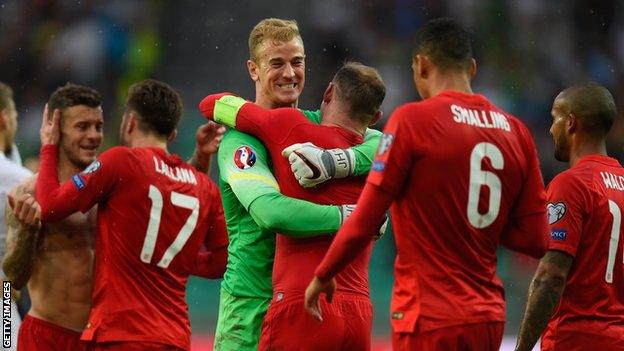
The home-grown rule aims to increase the pool of quality players available for England
The number of home-grown players used in the Premier League last season was "not bad" but there is room for improvement, says Football Association chief executive Martin Glenn.
Greg Dyke, the FA chairman, said recently, external that English players in the top flight are an "endangered species".
Just 33.2% of the players who started games on the opening weekend were English, down from 35% last season.
"The 35% is not a bad number per se, just lower than Germany," said Glenn.
Almost 50% of starters in the Bundesliga last season were German, with the top divisions in Spain, France and Italy boasting figures, external of 58%, 56% and 43% respectively.
Lack of English players pathetic - Dyke
Only 73 of the 220 players who started the opening Premier League weekend were English, a figure that Glenn accepts is a concern.
"The clubs, the Premier League, the Football League and the FA all agree it would be desirable to get a higher percentage of England-eligible players playing, we are just not totally aligned yet on the means," said Glenn, who was speaking at the launch of the National Game Strategy for Participation and Development.
"It is an opportunity for all of us and I am confident through sensible dialogue and a few tough arguments we will get to a better place.
"I am a big believer in collaboration rather than antagonism".
In 2013, Dyke created a commission with the aim of increasing the number of English players in the Premier League to 45% by 2022.
Dyke made a number of proposals to help achieve this goal, including increasing the minimum number of home-grown players in a club's first-team squad of 25 from eight to 12, phased over four years from 2016.
The Premier League agreed to a consultation over the proposed changes in March this year.
'Young English players fall into black hole'
Glenn agrees with former Manchester United, Everton and England player Phil Neville, who said in March that a generation of English talent is disappearing "down a black hole" because of a lack of opportunities.
The FA chief executive suggested one way of "unblocking" the "logjam" would be to follow the example of other European countries who "produce talented kids who go across the world to play football".
'England aim to win every tournament'
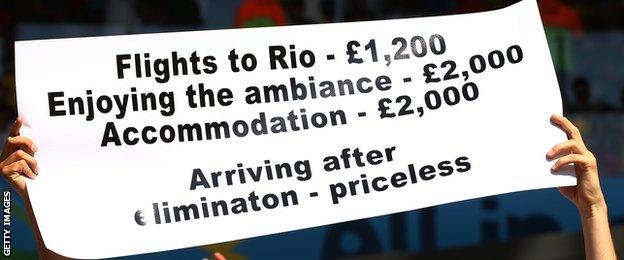
England exited the 2014 World Cup in Brazil at the group stage having failed to win a game
The FA wants to increase the number of home-grown players in Premier League squads in order to improve the quality of the pool of players available for the England team.
Roy Hodgson's side exited the 2014 World Cup at the group stage, but have won all six of their games in qualifying for Euro 2016.
Glenn has said, external England's aim is to win the 2022 World Cup, but sees no reason why success cannot come earlier than that.
"We are investing a lot more in coaching to give us a great chance and it takes time, but tournaments do not come around very often," he added.
"I look at every tournament as massively precious. For the Euros and the World Cup in Russia we have strong ambitions to absolutely win those tournaments. Why would you not go in to give it your best shot?"
'We are lucky to have Hodgson'
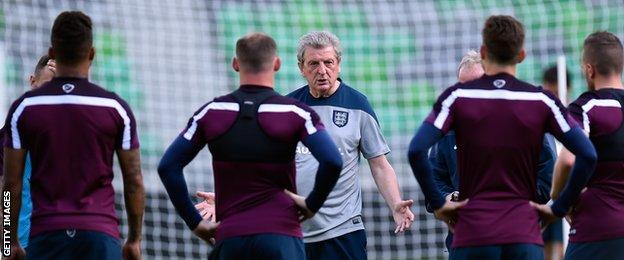
Roy Hodgson has been England manager since 2012
Hodgson's deal as England boss runs to the end of Euro 2016 in France.
New contract talks are not expected to take place until after that tournament, and Glenn suggested it is a situation Hodgson is happy with.
"I think it is right in the sense that, more than anything in life, football is a results game," he said.
"Roy is a great manager, we are lucky to have him. He has fantastic international experience, the qualification we are enjoying with the Euros has been great.
"Think about the disappointment of the World Cup, we stuck with him and that has been repaid handsomely.
"Roy is a proud man and, if he doesn't do well in the Euros, he would be the last person to say 'give me a contract extension'."
'Key moment' for women's football
England's women's team enjoyed great success in 2015, finishing third at the World Cup.
Their performance in Canada saw an increase in interest in the domestic game. Record crowds have watched Women's Super League matches, while just over 30,000 people attended the Women's FA Cup final between Chelsea Ladies and Notts County Ladies, more than double the previous record.
"We know leagues and clubs are being inundated with girls who want to play and teams who want to set up girls' teams," said FA director of participation and development Kelly Simmons.
"It is a key moment - utilising that support and getting more girls playing."
Interest increasing |
|---|
According to the FA, there are 40,000 more girls and women regularly playing football today than two years ago. |
There still remains a notable absentee from the WSL, with Manchester United without a women's team.
United run junior female sides but disbanded their senior team in 2005., external
"The landscape has changed in those 10 years," said former Everton and England goalkeeper Rachel Brown-Finnis.
"It was probably a decision made at executive level at the time - that the women's game was not something they wanted to brand up. Now it is very different. It is a very commercial product, something Manchester United could use to their advantage.
"It seems a win-win situation and I'd like to think it is only a short amount of time before they do decide to take the plunge and back a women's team."
'A wind of change'
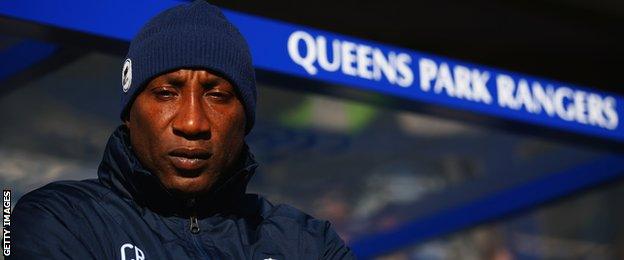
Last season, Chris Ramsey was the only black manager in the Premier League
Last season there was just one black manager working in the Premier League - Chris Ramsey at QPR. Now there are none.
"The numbers don't lie," said Brendon Batson, FA consultant on equality. "The season started last weekend and we have not got a black manager in the Premier League.
"When you look at the integration of black players from the mid-'70s you would have thought they would have graduated to the elite end in terms of coaching and management. That hasn't happened.
"We need things to be done. We want to see that, for those who have the qualifications and apply for jobs, there is a proper process."
Despite the lack of representation at the top level, Batson believes positive steps are being made.
The coach bursary programme,, external which started last year, offers aspiring coaches from the black minority ethnic (BME) community better opportunities to gain the qualifications required to boost their chances of getting elite-level coaching positions.
"I think this is one of the few times there has been a wind of change and it is starting blow a lot harder," added Batson.
"What the game is doing is providing these coaches with the qualifications and saying to rest of the game that when you have an opportunity to employ, look at these coaches."
- Published12 August 2015
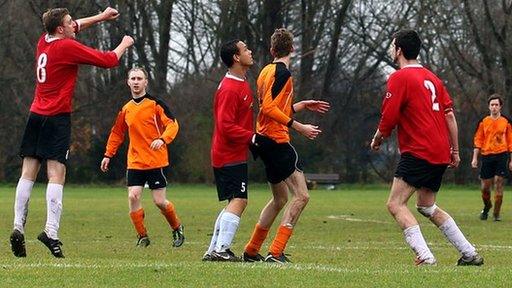
- Published11 August 2015

- Published12 August 2015
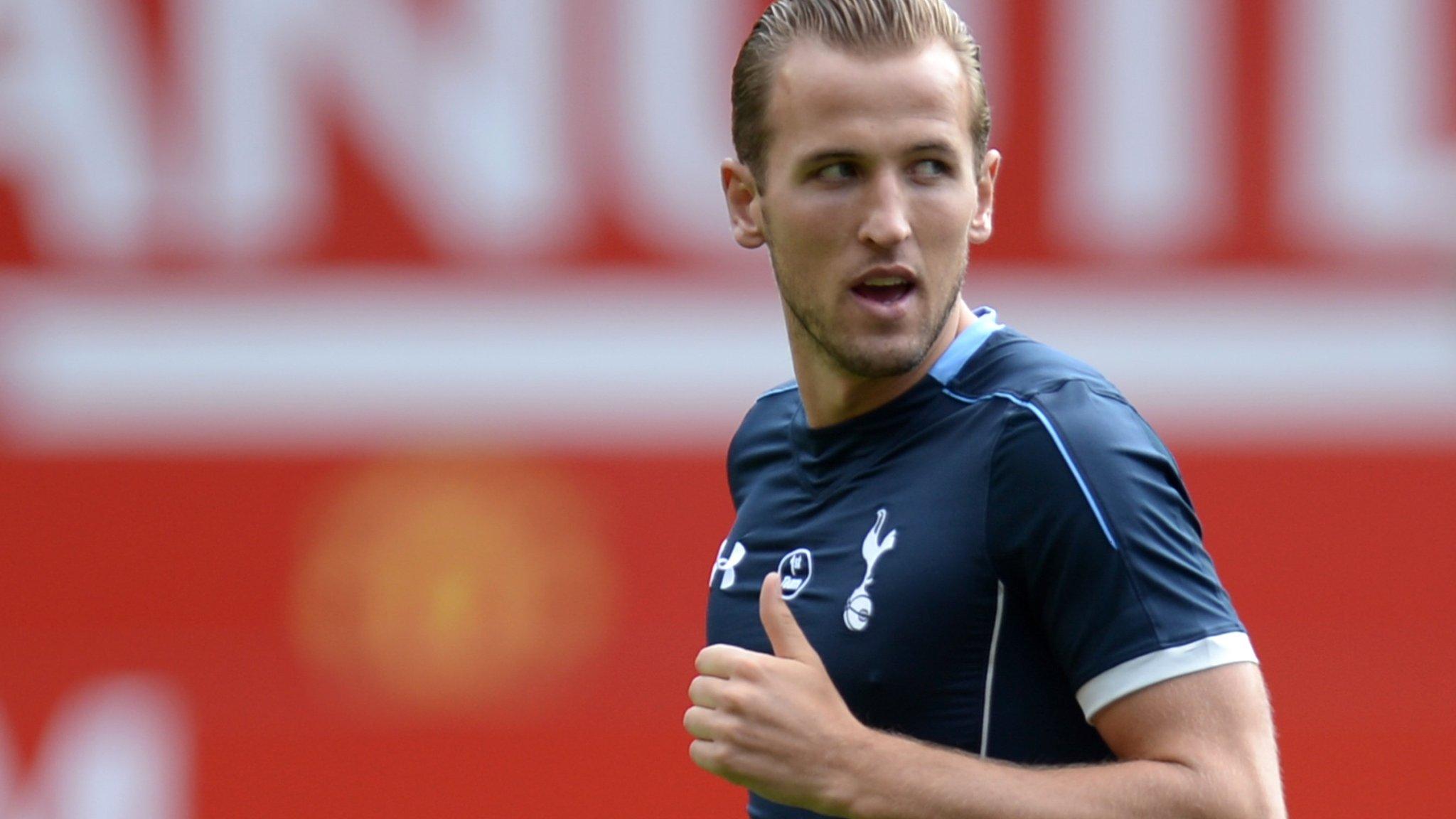
- Published20 June 2016

- Published7 June 2019
